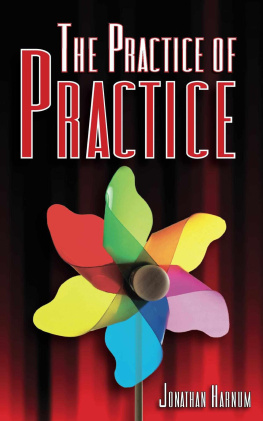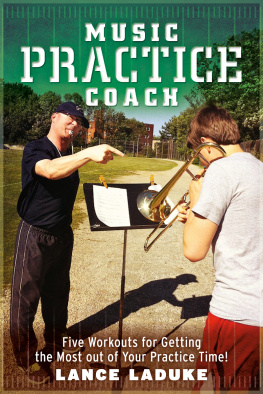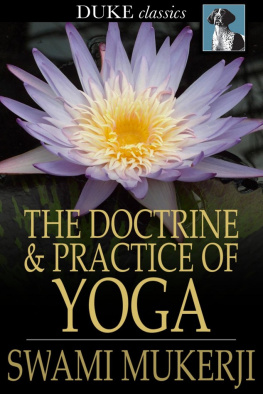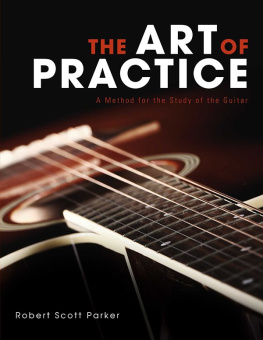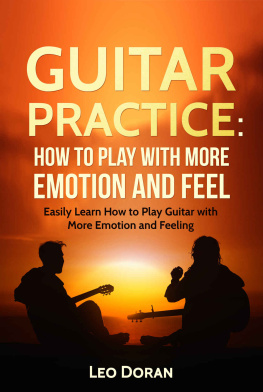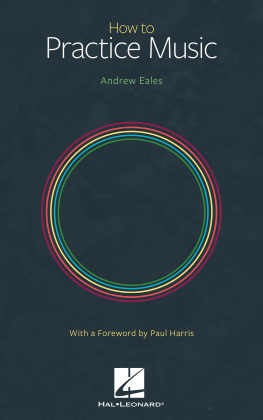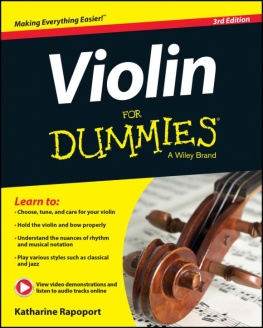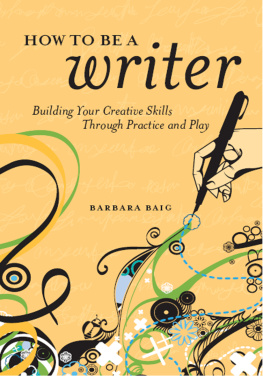Table of Contents
The Practice of Practice by Jonathan Harnum
Published independently by Sol Ut Press
Find musician-friendly resources at www.Sol-Ut.com
Copyright 2014 by Sol Ut Press and Jonathan Harnum. All rights reserved. No part of this book may be copied or reproduced by any means without prior written permission of the publisher. Sol Ut and the Sol Ut logo are trademarks of Sol Ut Press .
Sol Ut Press is committed to music education. Sol Ut Press has given away well over a million eBooks to music students all over the world . Get your own free digital copies of books on how to read music, jazz theory, and playing trumpet at www.sol-ut.com.
Find free supporting material for this book at: www.ThePracticeOfPractice.com
Publishers Cataloging-in-Publication
Harnum, Jonathan.
The Practice of practice / by Jonathan Harnum.
p. cm.
ISBN 978-14564079-7-1
Includes bibliographical references.
1. Practicing (Music). 2. Music --Performance --Psychological aspects. 3. Musical instruments --Instruction and study. 4. Music -- Instruction and study. I. Title.
MT170 .H37 2014
781.44 --dc23 2014909342
for Michelle
With sincere thanks to these generous musicians
Nicholas Barron
Ethan Bensdorf
Bobby Broom
Avishai Cohen
Sidiki Dembele
Hans J rgen Jensen
Ingrid Jensen
Sona JobartehOm Johari
Rupesh Kotecha
Rex Martin
Chad McCullough
Erin McKeown
Allison Miller
Peter Mulvey
Colin Oldberg
Nick Phillips
Michael Taylor
Prasad Upasani
Serge van der Voo
Stephane Wrembel
Dedication
To the Memory and Vision of Music Education Pioneer Bennett Reimer
It is how music is connected to life that makes it so important for people. To understand music is to understand its intimate connections to all of human experience. To experience music is to experience how we as individuals are connected to all other humans in our communities and all other communities in the world and in history. Music is all-encompassing.
Bennett Reimer (1932-2013) A Philosophy of Music Education, p. 60
Part One
Whats Goin On?
What Practice Is,What It Does to You, & Why It Matters
Learning without thought is labor lost;
thought without learning is perilous.
Confucius ( 551-487 BC )
Pick-Up Notes
Names have power. Definitions of what practice is (and isnt) can either lift you up or hamstring you. According to every professional musician Ive spoken with, practice is a lot more than sitting in a room alone, working on technique. Practice does some cool things to the brain, too. Knowing what the brain requires for solid, long-term learning will help you get better at music, or anything else.
Chapter
The Chicken or the Embryo
The sweat of hard work is not to be displayed. It is much more graceful to appear favored by the gods.
Maxine Hong Kingston, author (b. 1940 )
Z ing-Yang Kuo rubbed warm Vaseline over a clutch of fertilized chicken eggs. He was conducting research that examined the role genetic memoryor instinctplayed in the pecking behavior of chickens. You could say Zing-Yang Kuo was investigating a young chicks talent for pecking.
Kuo was a developmental psychologist active in the first half of the 20 th century who investigated the role of nature-versus-nurture in animal behaviors. Kuo believed that labeling behaviors as instinctive or genetic blinded us to the developmental realities that he suspected lay behind those behaviors. In the early 1920s when Kuo published his research, many believed the distinctive pecking behavior of newly hatched chickens was an instinct, a behavior encoded in chickeny genetics. Zing-Yang Kuo discovered that a chicks ability to peck is a result of a much more interesting process, one that smudges the line between nature and nurture.
As the petroleum jelly soaked into the egg shells, the shell became translucent. Kuo carefully watched the golden yolks develop into embryos. After a few days of development, the tiny proto-hearts of the chicks began to beat. Soon, the yolk was consumed by the growing chick, and each delicate crche now contained a tightly compacted future chicken. Each chick was packed so snugly in its shell that its neck was stretched downward until its head rested directly over its tiny thumping heart.
Kuo observed something interesting about the position of the embryos head. The motion of the rhythmically pulsing heart caused the developing chicks head and neck to move in a way that precisely mimics the characteristic pecking motion chicks use when feeding. The pecking motion is not encoded in the genetic code. Instead, the chicks practice the pecking behavior thousands of times inside the egg before hatching.
The kind of practice chicks are doing inside the egg is certainly not deliberate practice. Call it circumstantial practice. Its kind of like practice that happens because of where you grow up. Indian classical vocalist Prasad Upasani said, We have a word for it called samskar , which basically translates to unconscious influence. Basically you develop an ear for music. It definitely helps to be exposed to a lot of music at an early age.
Prasad Upasani is an accomplished vocalist in the Hindustani classical musical tradition of northern India. One of Prasads earliest memories was waking to hear his fathers singing practice early in the morning. Sometimes young Prasad would toddle in and sing some of his favorite melodies with his father. He spoke fondly of those early-morning sessions with his dad. Researchers have found that many professional musicians early experiences with practice were pleasant or fun. It stands to reason that if practice is pleasant or fun early on, well want to do more of it. A good thing to remember if youre a beginner of any age, or a parent.
Some practice takes place because of where we happen to be. You can see Samskar in the biographies of lots of accomplished people, including Sona Jobarteh, the only female kora virtuoso in the world. She grew up in the rich sonic environment of a Griot family in Gambia, West Africa. The Griot tradition is a venerable one, going back over 700 years. Griots were musicians and dancers who traveled throughout the Mali empire bringing news, diplomacy, and ceremonial services to commoners and royalty alike. Ms. Jobarteh first began to learn kora at age four from her brother, Tunde Jegede.
Or consider master tuba player and teacher Rex Martin. Both of Rexs older brothers played tuba, so Rexs auditory cortex was exposed to the sound of the tuba before he was even born. Neuroscience tells us that when the brain hears a new sound, it gets to work processing that sound until it recognizes the input, helping us attend to the sound more closely. Rexs young brain received tuba listening practice very early in his development. There is some pretty solid scientific evidence that babies in the womb can learn songs and sounds, one of the most important sounds being mommys voice.
The samskar , or unconscious early experiences of Prasad, Sona, and Rex are similar to the chick practicing its pecking behavior inside the egg. Unconscious influences like these are one source of the pernicious notion of natural talent, the idea that youre either born with musical ability or youre not. There is a great deal of lively, sometimes heated debate as to whether natural musical ability exists.
For our purposes, natural musical ability is a can of worms best left alone, because the answer to the question, fascinating though it might be, has nothing to do with getting better. Whatever gifts have been given or withheld from you, practice is still the only way to get better at anything: music, chess, sports, programming, parenting.... Anything.

